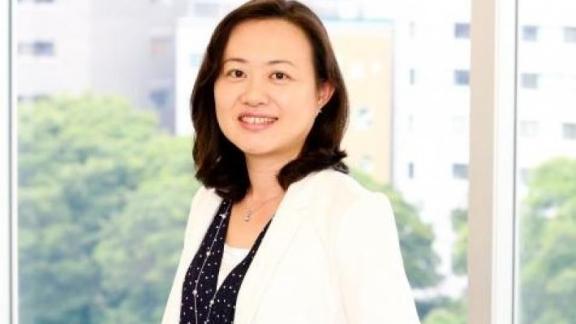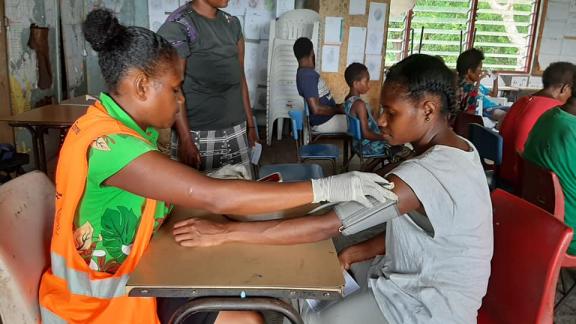Tell us a bit about yourself?
I grew up in a remote mountain area of the Philippines where the rice paddies are beautiful. Together with my parents who were Bible translation Christian missionaries, I spent my childhood days loving the village life. I also saw first-hand the hardships of life there. After returning to Japan, I wished for a career where I could serve people in the communities for a better life. My dream came true, as now in my role in the IPPF secretariat, I strive daily to support the Member Associations (MAs) achieve new heights in reaching all corners of their community, including the most vulnerable and marginalized population with quality SRHR information and services.
What does social entrepreneurship mean to you?
Social entrepreneurship, especially for non-profit organizations is a means for organizational strength and growth. The founder of the NGO where I first started my career, said that as non-profits, we must be able to feed our families and sustain ourselves, or else there is no serving others. Fee-charged general health check-ups, development and sales of educational materials, sales of contraceptives, and fee-charged training programs for adolescent health experts were all a way to generate income for the organization in promoting health for the people. Social entrepreneurship should become an internal part of IPPF Member Associations.
How important is the focus on self-generated income/social enterprises for your region?
It is certainly important, as the donor landscape continues to change rapidly with a shift of emphasis increasingly being placed on domestic financing for development. We cannot continue to depend on Official Development Assistance (ODA) coming from a few high-income countries. As countries also economically develop in ESEAOR, we are lower in ODA priority. IPPF MAs need to cultivate venues in which they can generate income locally, whether it be from governments or the public they serve. Social enterprises that build on their expertise and niche of service provision in their communities will certainly serve to expand the range and reach of services and bring on stability.
2020, due to the COVID-19 pandemic has brought with it some unique challenges (and maybe a few opportunities). How has this impacted your region’s SE activities?
COVID-19 pandemic has certainly brought on challenges, but it has also brought about opportunities. We have, for example, seen MAs start On-line Consultations linked with Online shops. Taking advantage of the information and communication technology advances we have seen in recent years, cultivating new means to reach the people we serve could open a new venue for social enterprise. Perhaps initiating new businesses that do not build on the regular work of the MA, would not be advisable during this pandemic when economies are being hard hit by the preventive measures put in place. Nevertheless, social enterprises that would take advantage of the situation could definitely thrive.
Some Member Associations (MA) have not yet thought about social enterprising. How can IPPF and the RO encourage and support them to consider this?
Understanding the donor landscape and creating a vision for the organization 10 or even 20 years down the road may encourage MAs to think about social enterprising. An organization cannot continue relying on donor funds entirely, and diversifying sources of income is crucial for organizational sustainability. While funds come from IPPF, things are fine, but one needs to think ahead in time. Social enterprise should be thought of as a means to enhance its service outreach and uptake, and the objective of the endeavour needs to be linked to the organizational mission.
If you could give a prospectively interested MA, two pieces of advice on Social Enterprise, what would those be?
Review your purpose and role as an organization in providing SRHR information and services in your community. Imagine what kind of organization you would like to be 20 years later. Try to find the area you excel in, compared to your competitors. What is your strength? What would be the area that you would like to develop further? Can you generate income from providing these services to the community? Does the sales of certain goods/technical expertise help you to achieve your mission while generating income at the same time? Build on a strength that you have now, and you will surely be able to succeed in creating a business from it.
Any recent videos, books, blogs or podcasts that inspired you or have been a contributor to your success?
We organized a webinar in December'20 with ‘WHO Geneva’ and ‘AeHIN’ on Digital Health for SRHR. WHO shared several resource materials recently developed that guide us in strategically planning, where we could invest in strengthening digital health. Although these are not directly social enterprise interventions, investing in digital health could lead to the cultivation of such an endeavour.
Digital Implementation Investment Guide (DIIG): Integrating Digital Interventions into Health Programmes
https://www.who.int/publications/i/item/9789240010567
Youth-centred digital health interventions: a framework for planning, developing and implementing solutions with and for young people
https://www.who.int/publications/i/item/9789240011717
ORIGINAL POST SOURCE: IPPF.WORKPLACE
when









